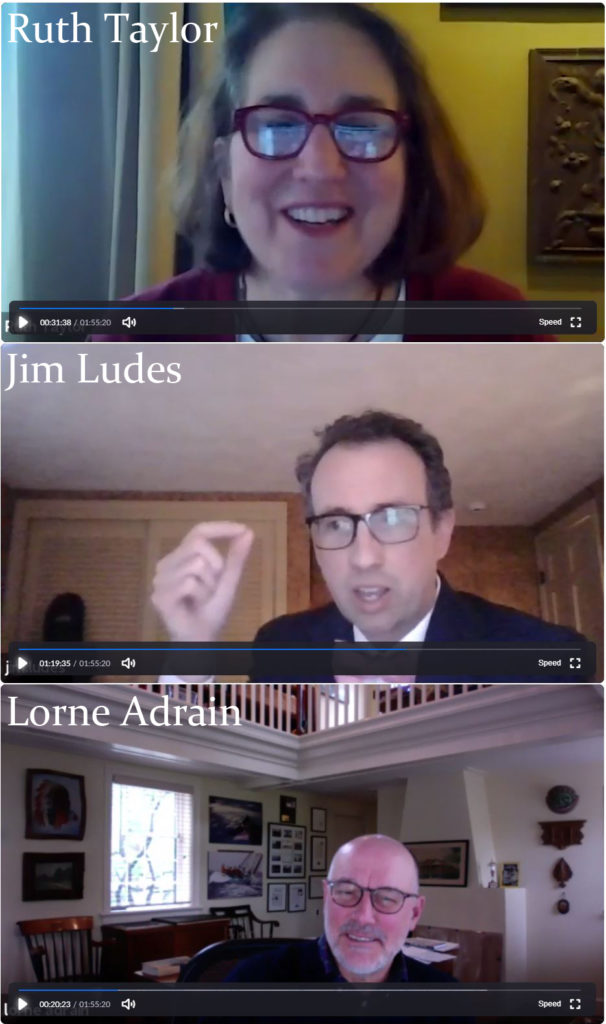 On Friday, April 3rd, the Newport Historical Society, with support from the Rhode Island Historical Society and the Zennovation Fund for Advancing Community Innovation, took its Civic Conversations series virtual, via Zoom. Twenty-five people gathered to discuss the question: What does crisis require of us, as Americans.
On Friday, April 3rd, the Newport Historical Society, with support from the Rhode Island Historical Society and the Zennovation Fund for Advancing Community Innovation, took its Civic Conversations series virtual, via Zoom. Twenty-five people gathered to discuss the question: What does crisis require of us, as Americans.
We asked ourselves not to focus on analyzing the current situation, with pandemic and economic collapse, but rather to think a bit bigger, and more historically, about our response to crisis generally, and what that response can show us. In a 90-minute conversation, we touched on many topics. As always, the goal was to express ideas, perspectives and opinions, not to create consensus or conclusions.
The conversation began with thoughts around what a crisis is, and for whom. By many standards, and for many people, American society was in crisis long before the pandemic hit – maybe since our founding. Participants suggested that our response to stress is culturally driven, and therefore can illuminate cultural norms and values, some of which may have been less apparent before the moment. A crisis can, too, shift norms, it was suggested, if we allow it.
We talked about the dichotomy between individual and collective action. In America, some thought, we salute the notion of individual heroism, but are only comfortable coming together for collective action when the threat is to our national identity. War, for example, can pull us together as it did in WWII. But climate change, which affects everyone on the globe, or a virus, which can be perceived to threaten only some, does not seem to have the same effect.
This led to some conversation about whether this moment is helping us to understand how connected we are, on the neighborhood level and the global one. Many thought yes: “I am dependent on my suppliers and their suppliers and the UPS driver and everyone who participates in my small economy.” “The global community of scientists are the ones who will lead us through this.”
Others were less certain that this understanding was a shared one. In some ways, the crisis has exacerbated a trend towards isolationism and walling off, a kind of circling the wagons. Even though the pandemic shows us that we are bound together by “our human bodies and our shared physiology,” as one participant said, there is a move to keep the people like us close to us and safe, and to stop worrying about everyone else. This, too can be seen on a local, national and a global level. The headline of a recent article suggesting that American should not be worrying about protecting New York City was an example.
We also talked about the future. Would this crisis lead to new ways of doing things, new leaders and new structures, new understandings? Was this our WWII, which lead to an international coalition of stability and relative peace, or is it our WWI, leading only to a period of more crisis? What kind of leadership will be required for the better outcome? One participant suggested that a generational transfer of power might help – it seems that young people are more naturally connected, less interested in boundaries. The assumption here was, of course, that this was the better path.
This brought us to a consideration of elitism. We were a group of well educated, thoughtful people of some privilege, though diverse in other ways. We contemplated how our assumptions and perspectives would play to a broader American audience, remembering that many do not have the time and leisure to think about a problem, because they are consumed with dealing with it.
Perhaps most compelling, for me, was the thread that ran through the conversation about connection, and the responsibility for each other that this implies. One participant suggested early on that crisis requires that each of us figure out what we can do – what are our talents, our sphere of influence, and our ability to act – and then do something. Certainly, it is this thought that lead the NHS to create this series. Here too, lay an important response to concerns about elitism: this is one thing that *we* can do. It was suggested that those who have the time and perspective to have these kinds of conversations need to have them. There is value here, and an assembling of ideas and perspectives, that is more than academic. I will add, as I did then, that if this is true, it is not enough to have the conversations among ourselves; we must also find a way to bring this kind of dialog to a broader public.
In the end, the technology worked, and this pilot online conversation was a success! If you would like to join us next month, please give us your name and email below. As always, your support for the NHS makes events like this possible.